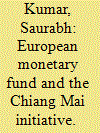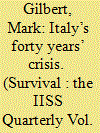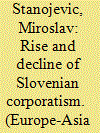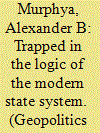| Srl | Item |
| 1 |
ID:
122806


|
|
|
| 2 |
ID:
138602


|
|
|
|
|
| Summary/Abstract |
The era of Silvio Berlusconi is over. Italy will never again be represented on the world stage by an ageing businessman with a turbulent private life, a criminal record and pariah status among other European leaders. Power has passed into the hands of a kinetic young man with a pudding-bowl haircut, Matteo Renzi, whose self-proclaimed mission is to rottamare (junk) the old guard in Italian politics and to revive the country’s institutions and economy.
|
|
|
|
|
|
|
|
|
|
|
|
|
|
|
|
| 3 |
ID:
114174


|
|
|
|
|
| Publication |
2012.
|
| Summary/Abstract |
In the 1990s a regulative pattern that strongly mirrored the structure and basic functions of post-war European corporatism was formed and stabilised in Slovenia. The system enabled the country's relatively fast and smooth inclusion in the European monetary system. However, its former rise and recent tendency towards disorganisation clearly overlap with the qualitatively different phases of Europeanisation. At first glance, this overlap supports the thesis that there has been a decline of corporatist pacts in the post-EMU period, suggesting that the decline is caused by the more or less successful internalisation of EMU demands and pressures during the accommodation process. In the Slovenian case, this interpretation is basically misleading. It is true that the decline of corporatism in Slovenia was connected with EMU pressures, but the primary source of its disorganisation lay in its specific micro-foundations.
|
|
|
|
|
|
|
|
|
|
|
|
|
|
|
|
| 4 |
ID:
123324


|
|
|
|
|
| Publication |
2013.
|
| Summary/Abstract |
In the wake of the Single European Act of the mid-1980s and a series of follow-on initiatives aimed at fostering greater integration in Europe, a number of commentators began describing Europe as a truly novel political-territorial arrangement. By the middle of the 1990s, however, the adoption of a common currency came to dominate the European integration agenda. The embrace of monetary union reflected a view of European integration that was firmly embedded in the logic of the modern territorial state system. That logic led many commentators to view the success or failure of integration in terms of the degree to which powers were being transferred from state governmental and economic institutions to the central decision-making bodies of the European Union. Such an approach cast the EU as a super-state rather than as a new type of political-institutional entity. As a result, the integration project was less subversive of the state system than it might otherwise have been - bolstering the view of the European Union as a distant bureaucracy not adequately attuned to the needs of everyday Europeans and fueling nationalist sentiments: a social force with deep roots in the modernist territorial order. Moving the European integration process forward will likely require embracing conceptions of progress that are less tethered to modernist territorial ideas and assumptions.
|
|
|
|
|
|
|
|
|
|
|
|
|
|
|
|